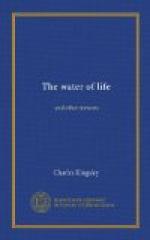And how Boaz goes to the town-gate next day, and sits down in the gate (for the porch of the gate was a sort of town-hall or vestry-room in the East, wherein all sorts of business was done), and there he challenges the kinsman,—Will he buy the ground and marry Ruth? And he will not: he cannot afford it. Then Boaz calls all the town to witness that day, that he has bought all that was Elimelech’s, and Ruth the Moabitess to be his wife.
’And all the people that were in the gate, and the elders, said, We are witnesses. The Lord make the woman that is come into thine house like Rachel and like Leah, which two did build the house of Israel: and do thou worthily in Ephratah, and be famous in Bethlehem.’
And in due time Ruth had a son. ’And the women said unto Naomi, Blessed be the Lord, which hath not left thee this day without a kinsman, that his name may be famous in Israel.
’And he shall be unto thee a restorer of thy life, and a nourisher of thine old age: for thy daughter-in-law, which loveth thee, which is better to thee than seven sons, hath born him.
’And Naomi took the child, and laid it in her bosom, and became nurse unto it.
’And the women her neighbours gave it a name, saying, There is a son born to Naomi; and they called his name Obed: he is the father of Jesse, the father of David.’
And so ends the Book of Ruth.
Now, my friends, can you not answer for yourselves the question which I asked at first,—Why is the story of Ruth in the Bible, and what may we learn from it which is necessary for our salvation?
I think, at least, that you will be able to answer it—if not in words, still in your hearts—if you will read the book for yourselves.
For does it not consecrate to God that simple country life which we lead here? Does it not tell us that it is blessed in the sight of Him who makes the grass to grow, and the corn to ripen in its season?
Does it not tell us, that not only on the city and the palace, on the cathedral and the college, on the assemblies of statesmen, on the studies of scholars, but upon the meadow and the corn-field, the farm-house and the cottage, is written, by the everlasting finger of God—Holiness unto the Lord? That it is all blessed in His sight; that the simple dwellers in villages, the simple tillers of the ground, can be as godly and as pious, as virtuous and as high-minded, as those who have nought to do but to serve God in the offices of religion? Is it not an honour and a comfort, to such as us, to find one whole book of the Holy Bible occupied by the simplest story of the fortunes of a yeoman’s family, in a lonely village among the hills of Judah? True, the yeoman’s widow became the ancestress of David, and of his mighty line of kings—nay, the ancestress of our Lord Jesus Christ Himself. But the Book of Ruth was not written mainly to tell us that fact. It mentions it at the end, and




